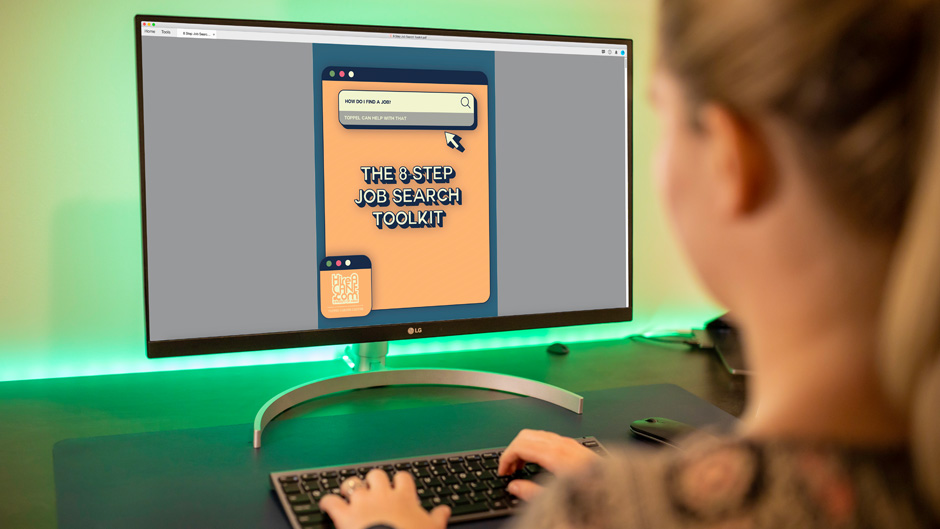With the economy slowly, but steadily improving from the shock of the COVID-19 pandemic, advisers at the University of Miami Toppel Career Center want to make sure that graduating Hurricanes have all the support they need to find a job this year.
That’s why advisers recently created the 8-Step Job Search Toolkit, an interactive digital workbook that guides University students through every step of the process. The toolkit comes as hiring begins to rebound from a difficult year. The National Association of Colleges and Employers recently reported that hiring is up 7.2 percent this spring, compared to 2020. In addition, unemployment numbers from the U.S. Bureau of Labor Statistics are hovering around 6 percent, after a high of 14.8 percent last April.
Christian Garcia, director of the Toppel Career Center, is optimistic about this growth and hopes that graduating ’Canes will take advantage of things like the toolkit to land a full-time position.

“This news is reassuring, but I think what students need to do is to start now,” Garcia said. “They can’t wait until they graduate—the more proactive students are, the better it’s going to be. They may not receive as many offers as two to three years ago, but companies are hiring. We haven’t seen anything to show that businesses aren’t hiring.”
Since the toolkit is written for seniors or graduate students, they should already have a résumé and some ideas about their desired job in mind, said Carly Smith, Toppel’s director of career education. If they don’t, these students should visit Toppel’s drop-in advising hours, she noted. Although the toolkit’s steps build on each other, it was created so that students can use the workbook as they need it.
“We know students are wrapping up the school year, and a lot of them are trying to finish all their classes. So, we wanted to create something flexible that students could work through at their own pace,” said Smith. “This workbook is self-guided, but Toppel supported. So, we will communicate with any student who requests the book—to check in, offer support, and talk students through the activities, if they want.”
Topics covered in the toolkit include:
- Organizing your job search (i.e. utilizing a spreadsheet to remember where you are in the process with each application)
- Tailoring your résumé for the job
- Researching your desired industry
- Making the most of Handshake (the largest job database in the country, which all University students have access to)
- Making connections (utilizing tools like Cane2Cane, the alumni career networking platform)
- Interviewing techniques
- Staying motivated
- Considering alternatives to full-time jobs
Austin Gravely, business analytics graduate student, helped Toppel put the toolkit together while he is job hunting himself for a data scientist or data analyst position. According to Gravely, using a spreadsheet—to monitor his job applications and to keep track of where he is in the interview process—is helping him to stay focused and motivated throughout the job search.
“We want students to find a job in the industry they are looking for and position themselves to have the best options,” Gravely said.
While much of the career advice Garcia offers is contained in the toolkit, he reiterated some ideas because of the ongoing pandemic. First, he said applying to one or two jobs per week is not enough and students need to be doing much more each day.
“In times like these, many students want to bury their head in the sand and say, ‘the economy is bad, why should I bother’?” he said. “But you can’t get a job if you don’t apply for a job.”
Also, with Handshake, applying for a job has never been easier, Garcia noted. Students can upload their résumés to the platform, make their profiles public, and employers can find them. When students find jobs they want, all they have to do is click apply and the platform sends their résumés. As Handshake learns a student’s job preferences, it begins to suggest open positions in the industry of choice. And if they do get a job or an interview, students can look up a company’s ratings and read employee commentary.
Garcia also encouraged graduating students to make sure everyone they know is aware that they are looking for a job and their industry of interest. Students can also expand their network using Handshake or Cane2Cane to find University alumni in their area and connect with them via email. Most alumni want to help, Garcia pointed out. Students can also attend industry panels that Toppel offers almost weekly, where companies share information and often recruit potential candidates.
“Be unapologetic about your job search,” Garcia emphasized. “While your parents may not be in your industry, they have friends and you just never know. This is a time to ask for help.”
He also made a point to remind students that job descriptions are like a wish-list for employers, but they still hire people that don’t match all of the criteria. So, students should not be discouraged if they don’t meet every qualification listed.
Finally, Garcia stated that seniors need to be flexible and to recognize that the first job they get may not be their ideal position.
“Hardly anyone’s dream job is their first job out of college,” he said. “This doesn’t mean you should take any job but realize that your first job could be a stepping-stone to your next opportunity.”

